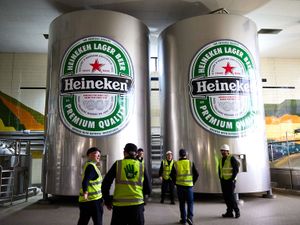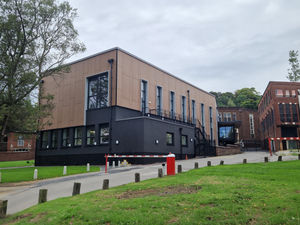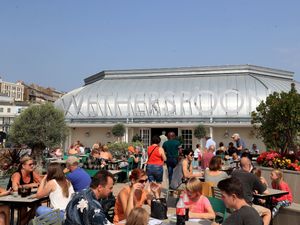2015 in review: Growth and demise: the region's highs and lows
It has been a year of growth for many of the Black Country's most prominent businesses, but 2015 started out on a sour note as 2,300 workers at delivery firm City Link lost their jobs when the company collapsed over Christmas.
On the broad economic front the year started as it would continue, with interest rates remaining at their historic low for a sixth year, while unemployment continued to fall.
This was despite a global slump in demand for oil and raw materials which sparked a dramatic slowdown in China's economy during the year, causing a brief but nasty scare on global stock markets during the autumn.
On a brighter note, January saw Birmingham Airport issue the first of a string of record passenger figures that put it on course for its best-ever year. In February Wolverhampton Wanderers revealed it had lost £1.7 million during its season in the First Division, as it battled back into the Championship. Over in West Bromwich, Albion soared to record profits of £14.m, while chairman Jeremy Peace confirmed he was looking to sell his majority shareholding in the club.
There was good news in March, as it was revealed that HSBC bank would be moving its UK operation from London's Canary Wharf to new offices in Birmingham, along with more than 1,000 jobs.
But the month also so the demise of Black Country bakery Firkins after 144 years. Twenty three shops closed and 104 jobs were lost as it went into liquidation after repeated attempts to keep the business going over the previous nine years.
More jobs went the following month, as newly merged group Dixons Carphone revealed 500 people would be made redundant with the closure of a major delivery depot at Wednesbury.
April also saw the destruction of the Teknor Apex plastics factory in Oldbury in a suspected arson attack.
But there was better news at Wolverhampton-based beer and pubs group Marston's, as it unveiled a £25m takeover for brewer Thwaites.
And Willenhall-based Poundland declared its sales had topped £1 billion. As it headed into its 25th anniversary year the company would also announce plans to snap up smaller rival 99p Stores for £55m.
In May, the Express & Star discovered Jaguar Land Rover was putting together plans to double the size of its engine factory in Wolverhampton. JLR had a mixed year, with its sales hit by a sharp decline in China. In August it became a victim of the Tianjin disaster, a huge chemical explosion and fire at the Chinese port which claimed 179 lives. Nearly 6,000 Jaguars and Land Rovers stored nearby were wrecked and the company faces a loss of up to £245m.
But in November the company finally confirmed it would be pumping an additional £450m into expanding the Wolverhampton site, creating a £1bn factory and creating hundreds of new jobs.
Before that, a grim summer saw the horrific accident at Alton Towers theme park in Staffordshire. Visitor numbers plunged and owner Merlin Entertainments announced 190 job losses.
And there was more gloom in Wolverhampton as US tyre giant Goodyear revealed it would be closing its landmark factory in the city after 90 years.
It said 330 workers will lose their jobs as it shuts down over the next two years. They are the last remnants of a workforce that numbered around 6,500 in the 1980s when the factory stretched half a mile along Stafford Road.
September brought better news, as online cycle store Wiggle opened its new warehouse in Bilston, with 150 new jobs. But plans for a £35m new hub on derelict land in Essington, drawn up by delivery firm DX Freight, face strong opposition from local villagers who must wait until the New Year for South Staffordshire Council to make a decision.
Meanwhile Wolves fans, already mourning the loss of their beloved Sir Jack Hayward – who died aged 91 in January – discovered their new owner had put the club up for sale. After a run of poor form on the pitch led to increasingly bitter and personal criticism, Steve Morgan, founder and boss of housebuilder Redrow, announced he was stepping down immediately and putting the club on the market.
September also saw the long-awaited opening of the £150m Grand Central shopping centre, part of the £600m revamp of Birmingham New Street railway station. It includes a major new John Lewis store and attracted thousands of visitors on its opening day.
It was a summer of retail joy for Birmingham, which had already celebrated the opening of a new Harvey Nichols store in the transformed Mailbox building.
But German carmaker Volkswagen was revealed to have cheated on emissions tests on nearly 500,000 diesel cars in the US. The scandal has widened to include millions of cars worldwide and the cost to VW is now in the billions.
In October a growing crisis in the global steel market saw Indian-owned Tata Steel announce 1,200 job losses in the UK, while the SSI steelworks in Redcar was shut with the loss of 2,200 jobs.
Black Country-based Caparo Industries collapsed into administration just days later. More than 400 of the engineering group's workforce were sacked almost immediately but administrators from PwC have managed to sell off parts of the business to new owners, securing the jobs of nearly 500 workers. But another 700, most of them in the Black Country, still face an uncertain future.
Two weeks after the collapse Caparo's 45-year-old boss, Angad Paul, died in a fall from his penthouse home. He had run the business after taking over from his father, Lord Swarj Paul – chancellor of Wolverhampton University – in 1996.
November also saw US industrial giant General Electric complete its £6.9bn acquisition of Alstom's power and grid businesses including its operation in Stafford, where the company employs 1,700 people.
And in Walsall, home repairs and insurance group HomeServe is aiming to create 300 jobs in the UK and overseas over the next 12 months. Growth in Europe and the US has seen customer numbers rise to 6.6 million at the company, which employs around 1,200 at its headquarters in the town.
Back at Goodyear, the first workers are set to leave the company on New Year's Eve.





